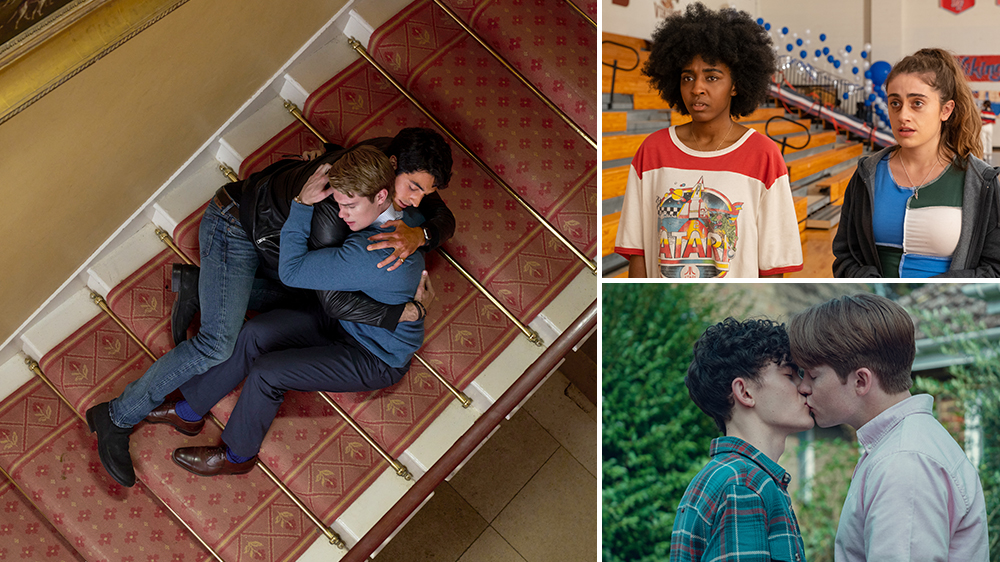Within a three-week time span this August, audiences have been able to watch two British teenage boys wrestle with when to come out as a couple to their school (in Season 2 of the Netflix series “Heartstopper”), the first son and the prince of England make passionate love in a plush Parisian hotel suite (in the Amazon Prime Video rom-com “Red, White & Royal Blue”) and a pair of lesbian BFFs start a fight club at their high school to cajole the hottest cheerleaders to sleep with them (in the MGM sex comedy “Bottoms”).
This is, to put it mildly, unusual.
“When I started out, you’d have one queer show in the U.K. on TV a year — or every other year — and that was it,” says “Heartstopper” executive producer Patrick Walters. “It was a niche thing: One and done, and then we move on to more ‘mainstream’ stories.”
Instead, this month boasts the greatest concentration of high-profile queer content in recent memory. On Max, the DC animated series “Harley Quinn” and “Sex and the City” sequel series “And Just Like That” have been exploring queer characters’ messy attempts at long-term relationships. Meanwhile, the new season of the FX comedy “What We Do in the Shadows” boasts a cast of perpetually horny pansexual vampires who help throw a magically inappropriate Pride parade on Staten Island.
None of these titles could fairly be called blockbuster sensations, but they’ve all, to varying degrees, been hits — “Heartstopper” and “Red, White & Royal Blue” debuted at or near the top of their respective streamers’ Top 10 charts. More to the point, with this many options available at one time, none of these titles has to be a sensation. That’s in sharp contrast to what happened to “Bros” last September. Breathlessly touted as the first major studio romantic comedy about two gay men, it bombed in theaters, grossing just $14.8 million worldwide, and left the stinging — and fallacious — impression that mainstream audiences weren’t interested in any queer stories.
Rather than soft-pedal or abandon their productions, however, both Netflix and Amazon heavily promoted “Heartstopper” and “Red, White & Royal Blue” as significant releases.
“It is not very in vogue for a member of the WGA to say anything nice about a studio,” says “Red, White & Royal Blue” director Matthew López, who adapted the script with Ted Malawer from Casey McQuiston’s bestselling novel. “So I’m saying this as a member of the DGA: I had real support from the studio to make this movie. I never went begging for more cash.”
Love Film & TV?
Get your daily dose of everything happening in music, film and TV in Australia and abroad.
López is quick to note that Amazon’s faith in his film was bolstered by McQuiston’s robust book sales. “You could chalk it up to people finally understanding that there’s actually money to be made from this,” he says of the rush of queer content. “My fear is that it’s a fluke. My hope is that it represents a willingness to allow queer filmmakers and queer storytellers to own their work in ways that I think we’ve never been allowed to before. We are not a monolith. We have as many stories inside of us as there are queer individuals who are telling stories.”
Indeed, “Bottoms” — with its gleeful ultraviolence and extravagantly profane worldview — could scarcely feel more different from the earnest and gentle “Heartstopper.” Director Emma Seligman, who co-wrote “Bottoms” with star Rachel Sennott, was inspired by her love of “over-the-top high school movies” from the ’80s and ’90s that have fallen out of fashion. “I wanted to bring it back, and part of bringing it back for me is making it queer and female driven,” she says. “But that doesn’t change the genre. It’s just our version of it.” (The film premiered at SXSW in March and debuts in theaters Aug. 25.)
“Heartstopper” also reframes teenage romance through a queer lens, especially as Season 2 broadens its scope beyond the core couple of Nick Nelson (Kit Connor) and Charlie Spring (Joe Locke) to its lesbian, trans and asexual characters. And simply centering LGBTQIA characters in a tried-and-true storytelling format automatically set the project apart.
“We were trying to make a show that appealed widely to all ages, but specifically to the younger teen audience,” says Walters. “And there just wasn’t a show like that.” Rather than view “Heartstopper’s” uniqueness as a liability, however, Walters and his colleagues at See-Saw Films used it as a selling point. “We said to Netflix, ‘You’ve got to be part of this because it’s doing something that’s not been done before, and that’s really exciting.’”
Even a cursory search of social media for reactions to “Heartstopper” and “Red, White & Royal Blue” makes plain the impact they’ve had on audiences — and how queer visibility has changed for Gen Z viewers. Just one example: Freshly out “Stranger Things” star Noah Schnapp recently went viral for tweeting, “Where do I find a Nick Nelson?”
In that kind of environment, says Walters, producers need to strike while the iron is (ahem) flaming hot.
“I think the real danger, in terms of being a queer producer and queer creative, is that you don’t go, ‘OK, we’ve done that one thing, and we’re not going to get it again, so we’re not going to ask again,’” he says. “You have to keep going back to the decision-makers. There is such an appetite for all different types of queer stories. We should keep going.”
Jaden Thompson contributed to this story.
From Variety US































